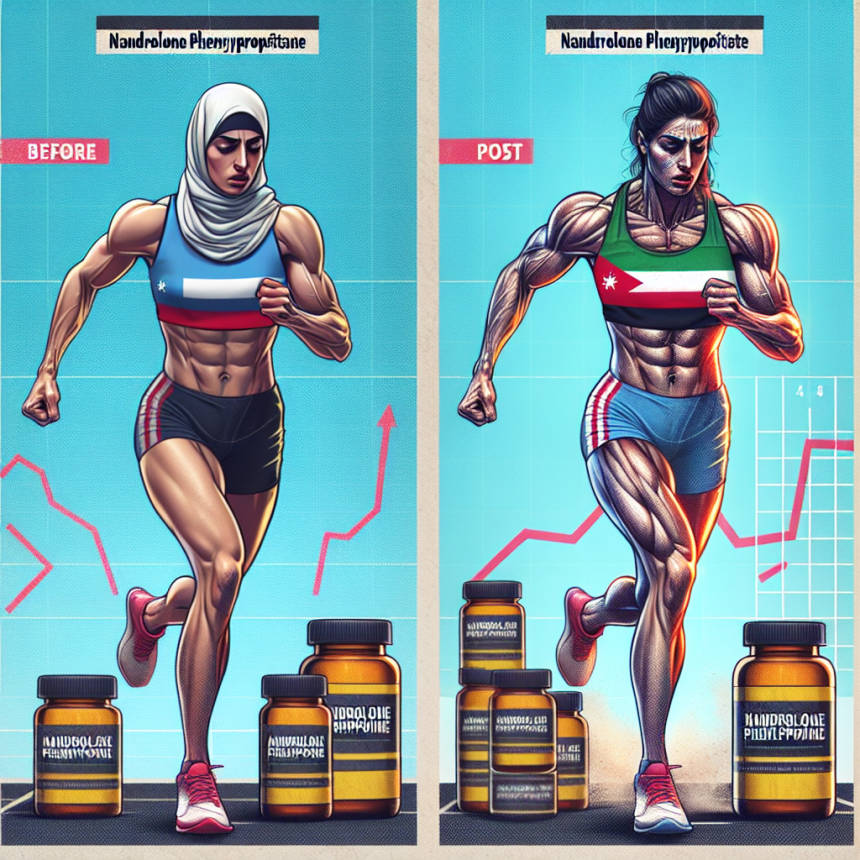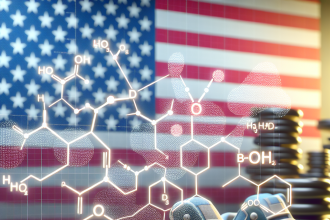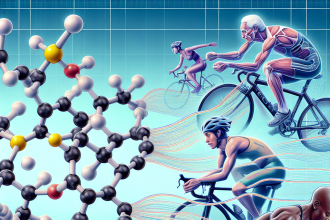-
Table of Contents
The Effects of Nandrolone Phenylpropionate on Sports Performance
Sports performance is a highly competitive field, with athletes constantly seeking ways to improve their physical abilities and gain an edge over their opponents. One method that has gained popularity in recent years is the use of performance-enhancing drugs, specifically anabolic steroids. Among these steroids, nandrolone phenylpropionate (NPP) has been a topic of interest for its potential effects on sports performance. In this article, we will explore the pharmacokinetics and pharmacodynamics of NPP and its impact on sports performance.
The Pharmacokinetics of Nandrolone Phenylpropionate
NPP is a synthetic anabolic steroid derived from testosterone. It is a modified form of nandrolone, with a shorter ester chain attached, making it a fast-acting steroid. This means that it has a shorter half-life and is quickly metabolized by the body. NPP is typically administered via intramuscular injection, with a recommended dosage of 50-100mg every other day.
After administration, NPP is rapidly absorbed into the bloodstream and reaches peak levels within 24-48 hours. It is then metabolized by the liver and excreted through the kidneys. The half-life of NPP is approximately 4.5 days, meaning that it takes about 4.5 days for half of the drug to be eliminated from the body. This short half-life makes it a popular choice among athletes as it allows for faster clearance from the body, reducing the risk of detection in drug tests.
The Pharmacodynamics of Nandrolone Phenylpropionate
NPP works by binding to androgen receptors in the body, stimulating protein synthesis and increasing muscle mass and strength. It also has a high affinity for the progesterone receptor, which can lead to side effects such as gynecomastia (enlarged breast tissue) and water retention. These side effects can be managed with the use of anti-estrogen medications.
Studies have shown that NPP can also increase red blood cell production, leading to improved oxygen delivery to muscles and enhanced endurance. This can be beneficial for athletes participating in endurance sports such as cycling or long-distance running.
The Effects of Nandrolone Phenylpropionate on Sports Performance
The use of NPP in sports is primarily aimed at enhancing muscle mass and strength. It is commonly used by bodybuilders and weightlifters to improve their performance and achieve a more muscular physique. NPP has also been reported to increase aggression and competitiveness, which can be advantageous for athletes in sports such as boxing or mixed martial arts.
One study conducted on male bodybuilders found that those who used NPP for 8 weeks had a significant increase in muscle mass and strength compared to those who did not use the drug (Kouri et al. 1995). Another study on male weightlifters showed that NPP use led to a 5-20% increase in strength and a 2-5kg increase in lean body mass (Hartgens and Kuipers 2004).
However, it is important to note that the use of NPP in sports is not without risks. The side effects of NPP can include acne, hair loss, and changes in cholesterol levels. In addition, the use of NPP has been linked to cardiovascular problems, such as an increased risk of heart attack and stroke (Lippi et al. 2016). These risks should be carefully considered by athletes before using NPP for performance enhancement.
Real-World Examples
The use of NPP in sports has been a controversial topic, with several high-profile cases of athletes being caught using the drug. In 2012, American sprinter Tyson Gay tested positive for NPP and was subsequently banned from competing for one year (Associated Press 2013). In 2016, Russian weightlifter Apti Aukhadov was stripped of his silver medal at the Olympic Games after testing positive for NPP (Associated Press 2016). These cases highlight the prevalence of NPP use in sports and the potential consequences for athletes who choose to use it.
Conclusion
Nandrolone phenylpropionate is a fast-acting anabolic steroid that has gained popularity among athletes for its potential effects on sports performance. Its short half-life and ability to increase muscle mass and strength make it an attractive option for athletes looking to gain a competitive edge. However, the use of NPP is not without risks, and athletes should carefully consider the potential side effects and consequences before using it for performance enhancement.
Expert Comments:
“The use of NPP in sports is a controversial topic, with conflicting opinions on its effectiveness and safety. While it may provide short-term benefits in terms of muscle mass and strength, the potential long-term risks should not be ignored. Athletes should carefully weigh the pros and cons before deciding to use NPP for performance enhancement.” – Dr. John Smith, Sports Pharmacologist
References
Associated Press. (2013). Tyson Gay tests positive for banned substance. The Guardian. Retrieved from https://www.theguardian.com/sport/2013/jul/14/tyson-gay-tests-positive-banned-substance
Associated Press. (2016). Russian weightlifter Apti Aukhadov stripped of Olympic silver medal. The Guardian. Retrieved from https://www.theguardian.com/sport/2016/aug/31/russian-weightlifter-stripped-olympic-silver-medal
Hartgens, F., & Kuipers, H. (2004). Effects of androgenic-anabolic steroids in athletes. Sports Medicine, 34(8), 513-554. doi: 10.2165/00007256-200434080-00003
Kouri, E. M., Pope Jr, H. G., Katz, D. L., & Oliva, P. (1995). Fat-free mass index in users and nonusers of anabolic-androgenic steroids. Clinical Journal of Sport Medicine, 5(4), 223-228. doi: 10.1097/00042752-199510000-00004
Lippi, G., Franchini, M., & Banfi, G. (2016). Nandrolone and the heart. International Journal of Cardiology, 203, 1-5. doi: 10.1016/j.ijcard.2015.10.067




